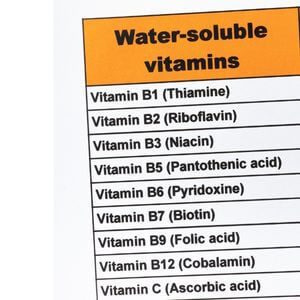B-complex vitamins and vitamin C are helpful for stress, neurological disorders, fatigue, and more.
When people first started earing refined foods (white flour, polished rice, refined sugar, and canned foods) as staples of their diet, they started experiencing new diseases. It was eventually discovered that important nutrients, which were later called vitamins, had been removed during processing. Without these water soluble vitamins the body could not convert calories into energy, produce important neurotransmitters, or maintain other normal body function.
Water-soluble vitamins, which include the B vitamins and vitamin C are found naturally in many foods. However, they are readily lost through heat, cooking, and other processing methods. Thus, they are destroyed when we refine grains and sugars, pasteurize milk and fruit juice, can and bottle foods and even from storing them for long periods of time.
Following this discovery, companies began fortifying processed foods with some, but not all, of these vitamins. This has ended over deficiency disease such as Beri Beri (vitamin B1 deficiency) and scurvy (vitamin C deficiency). Fortifying these foods still doesn’t provide adequate amounts to maintain optimal health for many people.
Lack of Water Soluble Vitamins
Lack of water-soluble vitamins can lead to many problems. They are required by mitochondria to efficiently convert food into energy. Also, they are necessary for the production of various neurotransmitters and hormones. Which means that over time even moderate deficiencies can lead to fatigue, weight gain, hormonal problems such as thyroid disorders, PMS, and adrenal fatigue, nervousness, mood disorders such as anxiety and depression and even mental illness.
Unlike the fat-soluble vitamins, the body does not have large stores of most water-soluble vitamins. These vitamins need to be regularly obtained in the diet. Because any excess is easily flushed out of the body in the urine, the are quite safe to take as supplements. Most of them are fairly benign even in large amounts. As long as you are getting a good supply of all of them, since they work together in many body processes.
In this issue of Sunshine Sharing we will explore these water soluble vitamins.

Water Soluble Vitamins and their Role in Health
Water soluble vitamins are very important when it comes to our health and and chronic disease. Vitamin C is needed for proper immune function. It is also very helpful for certain types of cancer, needed to heal injuries, and promote structural health. The health of our circulatory system and veins needs vitamin c and so does our body to handle stress. The B vitamins offer a host of support for our circulatory and nervous systems, diabetes, as well as our mental health.
Some examples of a few B vitamins and their benefits. Riboflavin (Vitamin B2) helps our cells create energy and individuals with anemia, migraines, cataracts, and carpal tunnel have found it helpful. Niacin (Vitamin B3) deficiency has been associated with dementia and certain mental illnesses. Pantothenic Acid (Vitamin B5) helps with cellular energy and liver detoxification. Vitamin B6 has been found by many women to be helpful for PMS. Vitamin B12 is needed by our red blood cells to form properly as well as our metabolism.
